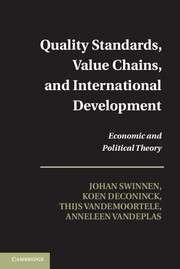Book contents
- Frontmatter
- Contents
- Preface and Acknowledgments
- 1 Introduction
- 2 Modeling Standards
- 3 Efficiency and Equity Effects of Standards
- 4 The Political Economy of Standards and Development
- 5 International Trade and Standards
- 6 Risk, Externalities, and the Nature of Standards
- 7 Endogenous Private and Public Standards in Value Chains
- 8 Butterflies and Political Economy Dynamics in Standard Setting
- 9 The Political Economy of Standards and Inclusion in Value Chains
- 10 Standards, Production Structure, and Inclusion in Value Chains
- 11 Standards, Market Imperfections, and Vertical Coordination in Value Chains
- 12 Market Power and Vertical Coordination in Value Chains
- 13 Price Transmission in Value Chains
- 14 Commodity Characteristics and Value Chain Governance
- 15 Economic Liberalization, Value Chains, and Development
- 16 Standards and Value Chains with Contracting Costs: Toward a General Model
- 17 General Equilibrium Effects of Standards in Value Chains
- References
- Index
16 - Standards and Value Chains with Contracting Costs: Toward a General Model
Published online by Cambridge University Press: 05 August 2015
- Frontmatter
- Contents
- Preface and Acknowledgments
- 1 Introduction
- 2 Modeling Standards
- 3 Efficiency and Equity Effects of Standards
- 4 The Political Economy of Standards and Development
- 5 International Trade and Standards
- 6 Risk, Externalities, and the Nature of Standards
- 7 Endogenous Private and Public Standards in Value Chains
- 8 Butterflies and Political Economy Dynamics in Standard Setting
- 9 The Political Economy of Standards and Inclusion in Value Chains
- 10 Standards, Production Structure, and Inclusion in Value Chains
- 11 Standards, Market Imperfections, and Vertical Coordination in Value Chains
- 12 Market Power and Vertical Coordination in Value Chains
- 13 Price Transmission in Value Chains
- 14 Commodity Characteristics and Value Chain Governance
- 15 Economic Liberalization, Value Chains, and Development
- 16 Standards and Value Chains with Contracting Costs: Toward a General Model
- 17 General Equilibrium Effects of Standards in Value Chains
- References
- Index
Summary
Introduction
As we have emphasized throughout the previous chapters, markets and value chains have undergone dramatic changes in recent decades. Sexton (2012) argues that “modern” markets no longer resemble the traditional textbook example of competitive spot markets, because simple spot markets are unable to cater to today's buyer needs, in particular strict requirements on quality control and supply consistency. This makes the process of supplier search and switching between suppliers particularly expensive – creating incentives for buyers to build up long-term relationships with their suppliers – and leading to an increased incidence of vertical coordination strategies, including production contracts. This is true even for agricultural markets, which are still cited in microeconomics textbooks as standard examples of competitive markets with many buyers and sellers that are small relative to the total size of the market, homogeneous products, perfect information, and perfect contract enforcement. However, as Sexton (2012: 209) points out: “I don't know of any modern agricultural market that meets all these conditions. Most don't meet any of them.”
This “new architecture of modern markets” has important implications for efficiency and equity. Sexton and colleagues emphasize the role of search and switching costs associated with quality and consistency requirements. These types of transaction costs are also increasingly important in emerging and developing economies. In this book so far we have focused on imperfections in rural factor markets and poor contract enforcement institutions, giving rise to additional transaction costs and different vertical coordination strategies. This raises the question whether these different types of transaction costs and the vertical coordination strategies that are implemented in response have the same implications for efficiency and equity, that is, whether the nature of the transaction costs matters. To analyze this question, this chapter develops a “general” model that integrates insights from different strands of the literature.
We develop a generalized theoretical framework accounting for quality requirements, contract-specific investments, factor market imperfections, imperfect contract enforcement institutions, and market power. As we are focusing on those transaction costs that directly derive from the contracting process, we will refer to them as “contracting costs.” We explicitly consider the key characteristics of different types of contracting costs (notably search costs, training costs, monitoring costs, and input costs), and derive the implications of these characteristics for the equity and efficiency effects of vertical coordination.
- Type
- Chapter
- Information
- Quality Standards, Value Chains, and International DevelopmentEconomic and Political Theory, pp. 256 - 268Publisher: Cambridge University PressPrint publication year: 2015



